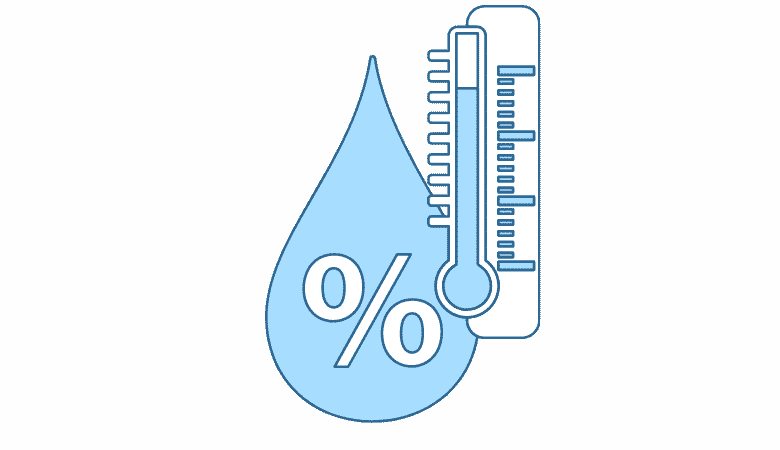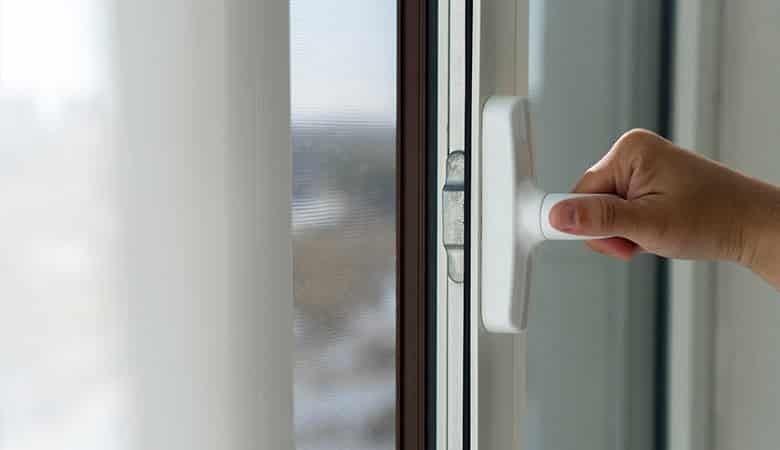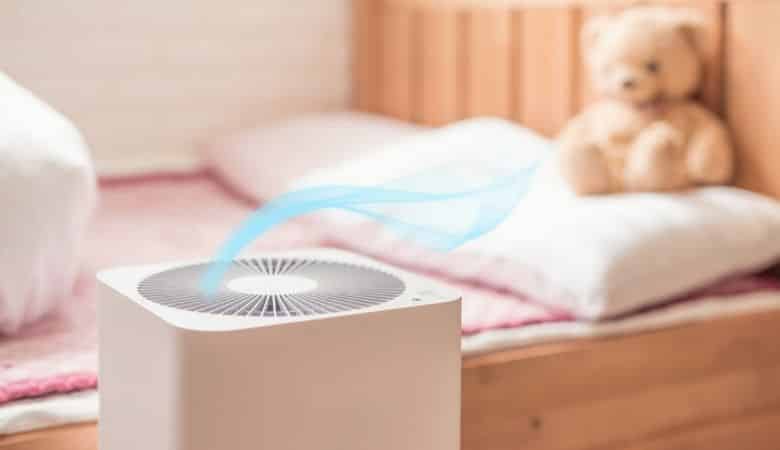Do you always wake up snappier than usual? Are you more tired awake than when you went to sleep? The list goes on with the reasons that you feel lousy each morning.
In today’s society, you are more prone to unhealthy sleep than before. Researchers are continually looking into the legitimacy of some of the reasons that you are not sleeping well.
So, can air quality affect sleep? And what should you do to improve it in your bedroom?
Poor air quality has been shown to be a causal factor for unhealthy sleep. Several studies confirm that air quality in your sleeping quarters can have detrimental effects on your sleep.
Furthermore, confirmation aside, they also have information on how to improve it in your bedroom. Throughout this piece, you will learn the different ways that poor air quality is affecting your sleep. Additionally, you will find out the simple methods to employ for premium air quality.
What is The Link Between Poor Air And Sleep Quality?

A recent study reveals that indoor air quality and thermal environment contribute to how well you sleep. The study involves participants sleeping in two separate rooms with different settings when they turn in for the night. Upon waking up, they record how rested they feel.
Furthermore, they take a cognitive assessment to determine their concentration. The findings show that those who slept with a fan operating enjoyed better rest, and their cognitive performance was higher.
The air you breathe is a mixture of compounds. Besides the gases you breathe, moisture, volatile organic compounds, and allergens are also present. Therefore, these different compounds in high concentrations significantly compromise your indoor air quality. Consequently, you end up experiencing inadequate sleep.
Here are a list of the culprits responsible for your horrible nights.
1. Allergens
Pollen, animal fur, and dust are the most common allergy-inducing compounds you can encounter. Exposing yourself to them when sleeping can cause breathing problems when sleeping.
Furthermore, the reactions are more severe in asthmatic people. Consequently, your body concentrates more on fighting allergies than sleeping. Continuous coughing and sneezing exert a lot of stress on the body, fatiguing it even more.
2. Volatile organic compounds
Relax. It has nothing to do with radioactivity and nuclear energy. Instead, it concerns the harmful chemicals floating around.
Do you see the gleaming Victorian chair next to your nightstand? It is slowly firing volatile organic compounds (VOCs) airborne. Over time, your air fills up with chemicals such as methylene chloride and carbon monoxide. The effect is more significant if you are the type that does not open the window.
Similarly, your mattress is not innocent either. Sleeping surfaces made from inorganic compounds such as polyurethane foam release VOCs to the air as they continue to age. Additionally, exposed mattresses are prone to fraying and shedding, further polluting your indoor air.
3. Humidity

The concentration levels of moisture in your bedroom air affect your sleep differently. High humidity causes the air to become heavy, making you struggle a little with your breathing.
Furthermore, high moisture levels make the air retain more heat. As a result, the room feels hotter. For example, saunas use steam to increase their internal temperature.
Conversely, low humidity air sucks your skin’s moisture leaving you dry and itchy. Furthermore, it dries your nasal passages making breathing very painful.
In either instance, humidity affects your comfort and breathing ability, both essential to a good night’s sleep.
How Can You Determine Your Indoor Air Quality?
You may notice that the discussion emphasizes good indoor air quality (IAQ). However, is there such a thing as an optimum standard?
Well, it exists. According to most health and environmental agencies like WHO and OSHA, the permissible levels of air contaminants are as below.
| IAQ parameters | IAQ standards | ||
| OSHA | WHO | EPA | |
| CO | 50 ppm every 8 hours maximum exposure of 8 hours | 10 mg/m3 | 25 ppm maximum exposure of 8 hours |
| CO2 | 5000 ppm | – | 7000 ppm |
| PM | – | – | – |
| PM 10 | 15 ng/m3 | 50 ng/m3 | – |
| PM 2.5 | 5 ng/m3 | 25 ng/m3 | 25 ng/m3 |
| SO2 | 5 ppm every 8 hours | 20 ng/m3 | – |
| NOX | – | – | |
| NO2 | 40 ng/m3 annually | 40 ng/m3 annually | 100 ppb maximum exposure of 1 hour |
| HC | – | – | – |
| Temperature | – | – | – |
| Humidity | – | – | – |
| Air Velocity | – | – | – |
None of the agencies above offers a blanket standard for you to comply with, as your location can influence concentration levels. However, they consider the above as acceptable standards that are not detrimental to your overall health. Furthermore, you only experience health complications after prolonged exposure.
How Can You Measure Your Indoor Air Quality?

Here are ways to know if you will get a good night’s sleep.
1. Your body will tell you
Before you start trimming the house budget, consider this. If you notice that it is getting harder to sleep each passing night, you have poor quality air in your room. Furthermore, you can validate this using the elimination method. You can do this once you finish reading.
- Create a list to include furniture with treated finishes, mattress cover integrity, and floor coverings.
- Next, record your findings as you do your room inspection. For example, write down that you have three chairs that you polish regularly. Additionally, record the number of carpets you have in the room, including your cleaning frequency.
- Then, take measures to reduce their effect on your sleeping environment. For example, if you have three chairs, reduce them to one and observe if your sleep improves. Alternatively, if you only vacuum your carpets once a week, increase the frequency to every other day and check if the situation improves. Although the process is longer, you will save money.
2. Do it yourself
The terms above may look like jargon to the average human. However, determining your indoor quality has never been easier. Thanks to modern technology, you can monitor your surroundings in real-time. Check out the following DIY manual.
- Fire up your laptop and look for an air monitor from your favorite online retailer.
- Ignore the many results on your screen. Instead, only go for devices capable of measuring CO2, VOC, and Particulate Matter (PM) levels. Additionally, consider those that can sync with your smartphone to receive push notifications and reports. If your budget allows, you can look for the Smart Home models. These can integrate with your thermostat and trigger your air conditioning when levels are off.
- After purchasing your device, install it in your room as per the manufacturer’s instructions.
Here’s a great multifunctional air quality monitor available on Amazon:
3. Let the pros do it
Multiple providers offer indoor air quality testing services. You can identify them under environmental services in the classifieds.
Alternatively, contact your local public environmental agency or visit their website. They usually have a list of agencies they authorize to conduct such tests within your locale. In addition, their inspections are much more thorough and include identifying carcinogens, mold, and radiation sources. Finally, the cost may vary depending on the test type.
How to Fix Poor Air Quality
Your report is out, and things are looking bleak. Do not start looking for alternative accommodation just yet. Instead, try these free hacks to improve your bedroom air.
1. Do a deep clean and declutter
A cuddle teddy bear on the bed is always lovely. However, they are dust magnets. Whether in a bungalow or a high-rise apartment, dust exposure is inevitable. Your body sheds hair and dead skin cells every day. Furthermore, your work shoes are not helping either. Over time, the dust accumulates in the air, and your teddy traps all of it.
Get your vacuum cleaner and some cleaning products and get cracking. First, steam clean your fluffy toys and pillows to rid them of dust and other air contaminants. Additionally, vacuum all carpets and all areas that can trap dust on their surfaces. For example, wardrobe tops and blind slats are some of the dust traps you ignore when doing a general clean.
Furthermore, free up your room by moving all unnecessary items to storage. Too much clutter in the room affects air circulation. Additionally, fabrics hold on to smells pretty well. For example, divans and futons with fabric coverings latch on to cigarette smoke smell amazingly well.
2. Open the windows regularly

It may seem an obvious solution, but very few people do it. After you make your bed, crack open the window and let out the stale air.
The temperature difference forces outside air to come in and refresh the room. Additionally, leaving the bedroom door open further enhances airflow within the rooms. Consequently, your indoor air quality improves as you do this regularly.
Alternatively, you can grab your toolbox and create a few more vents. There are plenty of DIY guides on simple home ventilation solutions. So why not implement one in your free time?
3. Consider greening your room
Houseplants are an inexpensive way of improving your indoor air quality. Green plants are the ideal natural air purifier. They absorb carbon dioxide from the air and use light to manufacture their food. Furthermore, they also complement your décor amazingly well.
Here are some recommendations to save you time. You can get the peace lily, devil’s ivy, or pigmy palm as a start. These are efficient at eliminating carbon dioxide and VOCs such as formaldehyde and carbon monoxide. Furthermore, they require very little maintenance.
Having plants in the bedroom has been somewhat of a controversial topic. If you want to learn more we recommend reading our article that explains whether it is good or bad to have plants in the bedroom
4. Ease up on the cleaning products
Fabric softeners, air fresheners, and cleaning products list synthetic chemicals as one of the ingredients. Furthermore, using them in large quantities exposes you to volatile organic chemicals such as formaldehyde, benzene, and tetrachloroethylene.
As their concentration increases, your bedroom air is increasingly becoming toxic. Furthermore, the effects are more adverse if you lack an efficient ventilation system.
5. A little automation is not bad

So, you have a little cash, and gardening is not your thing. What are your options? Well, you can improve your bedroom air by investing in one of these technologies.
- Air Conditioners
Aside from circulating the air, most modern air conditioners also regulate your bedroom temperature. Depending on your comfort level, you can set the unit to either raise or lower the temperature. Furthermore, high-end models include a humid control feature. As a result, the AC can vary the moisture levels in your bedroom as per your input.
Finally, if any of you is allergic to pollen and other organic compounds, go for the air conditioners that come with an air filtering system.
Amazon have multiple great portable ACs to choose between. You can find a list of various models here.
- Air purifiers
You may be wondering how these are different from air conditioners. However, get this. Air purifiers are portable air cleaners that can eliminate over 2500 toxins from your bedroom air.
For example, top-of-the-line models can filter out ammonia, benzene, and radon. Furthermore, manufacturers can further legitimize their devices by obtaining HEPA Certification. Devices with this certification have an efficiency of 99.97%, meaning they are in the 2500 toxin removal category.
Here’s a list of some great models available on Amazon.
- Room humidifiers
Say air toxins are the least of your bothers. Instead, it is the constant itchiness and flaky skin. Do you have a way out? Indeed, you do.
Varying humidity levels in your bedroom air can cause you discomfort and eventual loss of sleep. For example, bedroom air with very low humidity causes dry, itchy skin. Furthermore, as moisture leaves your body, your nasal passages dry as well. Consequently, you feel pain with every breath as air rushes through your nostrils.
Room humidifiers remedy the situation by releasing steam into the air to increase humidity levels. Furthermore, you can now find models capable of moisture control. These portable devices can either increase moisture or condense it to drinkable water. However, your budget will determine the features available to you.
Finally, humidity levels between 30-50% are perfect bedroom air for optimum sleep.
Check out this list of great air humidifiers on Amazon.
6. Bring in The Crew
Early builders were unaware of the effects of materials such as lead and asbestos. Therefore, you may find some of this material in your 100-year old home.
However, lead and asbestos are not the only VOCs that can compromise your bedroom air quality. For example, leaky wall pipes can lead to mold infestation whose spores are deadly if you inhale them. If you notice the infestation early, you can take care of it using organic cleaning products and replacing the pipe.
Alternatively, you can always hire a professional cleaning crew when things get out of hand. Professional cleaning services also provide IAQ testing and improvement solutions. Check your public environmental agency’s website for certified service providers. Why not try them and judge the results? You will not regret it.
What Else do You Need to Know About Air Quality?
You may still have a few more questions. Well, maybe this might help.
What is the obsession with Indoor Air Quality (IAQ)?
Indoor air quality measures how the air around you affects your comfort, health, and productivity. Additionally, the standards you see on the health and environmental agencies are for reference only. No binding standards exist that require your mandatory compliance. However, guidelines are available to help you address any issues with air quality.
What is the best indoor air quality for perfect sleep?
It does not exist. No matter how much science you put into it, the answer will always be controversial. The best bedroom air quality for perfect sleep solely lies in your preference. Depending on the solution you use to improve your IAQ, the best one is where you feel the most comfortable.
Summary
So, can air quality affect sleep? Yes, and adversely too. Therefore, apply and treasure the above information to ensure a perfect sleep night.

